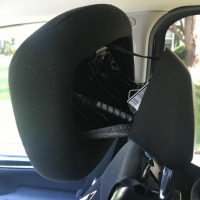
— A Mercedes-Benz class action lawsuit claims a headrest recall has never been issued for head restraints that are allegedly defective to the point of causing injuries.
The Mercedes class action lawsuit includes all former and current U.S. Mercedes-Benz owners and lessees in the U.S., except in Florida, of vehicles equipped with the headrests which Mercedes calls, NECK-PRO active head restraints.
The plaintiffs allege Mercedes should have ordered a recall because the automaker has known for more than 10 years the headrests have are defective and dangerous.
An active head restraint will allegedly help prevent whiplash injuries in rear-end collisions. The padded headrest immediately springs forward to catch the occupant's head. Or at least that's how it's supposed to work.
The Mercedes-Benz class action lawsuit says a defective head restraint can suddenly deploy without a crash, knocking the occupant in the head without them expecting the punch.
In the case of Mercedes, the active headrest was manufactured by Grammer.
The class action alleges all the NECK-PRO headrests share a common uniform defect that causes the devices to deploy without warning. An occupant may not only be injured by the impact with the head and neck, but the distraction to driving can allegedly cause even more hazards.
Mercedes Class Action Lawsuit Blames Cheap Plastic
The alleged problem is caused by cheap plastic brackets which are used as triggering mechanisms.
According to the headrest lawsuit, the plastic bracket holds a spring-loaded release in place until a sensor sends a signal a rear-end crash is occurring. But the plaintiffs allege cheap plastic was used to save money by Mercedes, cheap plastic that cracks and breaks prematurely under the constant pressure of the tensed springs.
There are hundreds of thousands of Mercedes vehicles in the U.S. allegedly equipped with defective active head restraints. And the class action lawsuit alleges there is no way to know when any of them will deploy suddenly and without warning.
Mercedes allegedly knew as early as 2006 the headrests were mistakenly deploying and hitting occupants in their heads.
The automaker was also allegedly aware the plastic brackets couldn't handle the constant force applied by the springs. However, Mercedes has allegedly done nothing to fix the problems, including by not ordering a headrest recall to repair the allegedly defective headrests.
According to the class action, the automaker allegedly blames customers for headrest troubles and refuses to cover any out-of-warranty costs.
Mercedes-Benz issued technical service bulletin (TSB) TB-91-16-177 regarding active headrests that activate for no reason. However, the plaintiffs claim Mercedes lied when it said the problem was caused by damage to the seat wiring harness.
The damage could cause a short-circuit which triggers the unintended deployment of the active head restraint.
Mercedes-Benz allegedly fails to warn customers about how the plastic bracket is made of Acrylonitrile Butadiene Styrene, or ABS.
According to what the plaintiffs say, ABS is a lightweight thermoplastic polymer that cannot handle the 75 pounds of force exerted on the bracket. That means once the plastic bracket breaks, the Mercedes headrest deploys at 12 miles per hour, or nearly 18 inches per second.
The TSB, according to the class action lawsuit, was issued only to conceal the alleged problems with the NECK-PRO headrests and to avoid the cost of replacing the headrests with non-defective headrests.
Again, the Mercedes-Benz class action doesn't include Florida, likely because a lawsuit filed there was already partly dismissed.
The Mercedes-Benz class action lawsuit was filed in the U.S. District Court for the Northern District of Georgia: Monopoli, et al., v. Mercedes-Benz USA, LLC, et al.
The plaintiffs are represented by Caplan Cobb LLP, Kozyak Tropin & Throckmorton LLP, Searcy Denney Scarola Barnhart & Shipley PA, Podhurst Orseck, P.A., Santiago Burger LLP, and Law Office of George Franjola.




